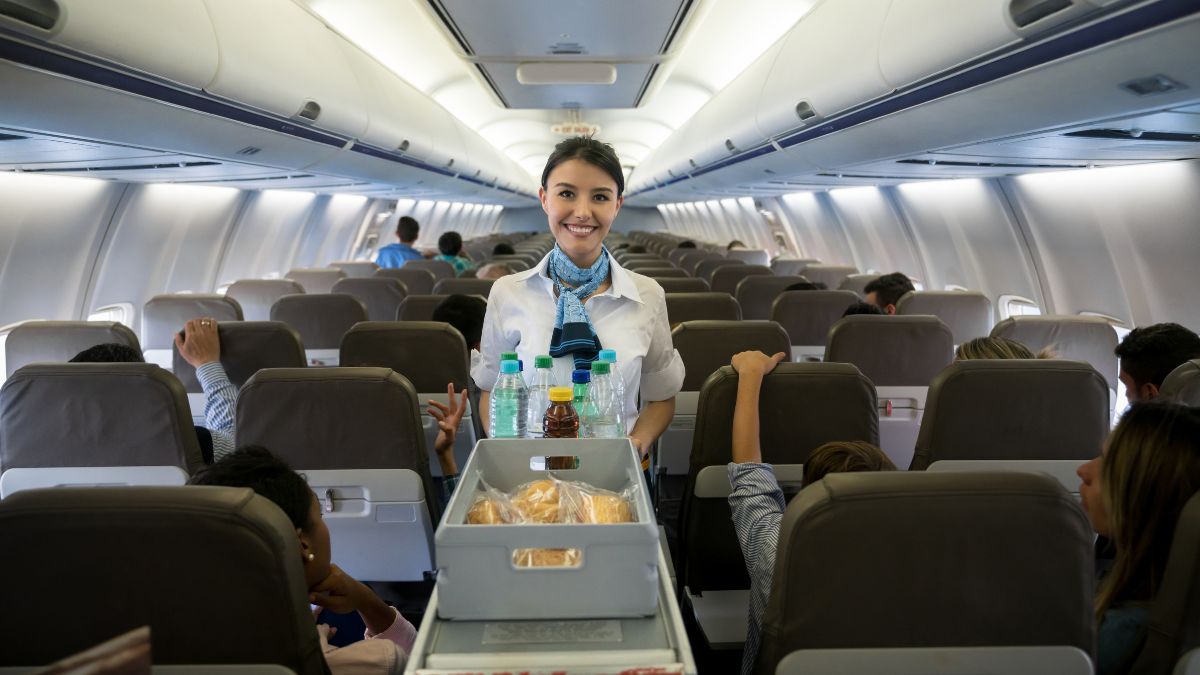Food Attendant Job Overview
If you are looking for a rewarding career in the food service industry, you may want to consider becoming a food attendant. A food attendant is a professional who assists in various aspects of food preparation and serving, such as chopping, slicing, weighing, wrapping, labeling, storing and delivering food items.
Food attendants work in different settings, such as restaurants, cafeterias, hotels, hospitals and schools. They may also specialize in certain types of food, such as salads, sandwiches, desserts or beverages.
Food Attendant Duties and Responsibilities
As a food attendant, you will be responsible for:
1. Following established recipes and procedures to prepare menu items according to customer orders and dietary requirements.
As a food attendant, one of your primary responsibilities is to follow established recipes and procedures to prepare menu items according to customer orders and dietary requirements. This includes carefully reading and understanding recipes, measuring and portioning ingredients accurately, and executing cooking or food preparation techniques as specified. By following these guidelines, you ensure consistency in food quality and meet the specific preferences or dietary restrictions of customers.
2. Serving customers in a courteous, efficient and friendly manner, providing information about food ingredients, availability and pricing.
Providing exceptional customer service is essential as a food attendant. When serving customers, your goal is to be courteous, efficient, and friendly. This includes greeting customers warmly, listening attentively to their orders, and providing detailed information about food ingredients, availability, and pricing. By being attentive and accommodating, you create a positive dining experience for customers and contribute to their overall satisfaction.
3. Ensuring an adequate food supply for customers. Preparing food according to food safety and hygiene standards. Ensuring food is served with an appealing presentation.
Maintaining an adequate food supply is crucial to meet customer demand. As a food attendant, you are responsible for monitoring food inventory, restocking items as needed, and ensuring the availability of menu items throughout the shift.
Additionally, you must adhere to food safety and hygiene standards at all times. This involves proper food handling, storage, and preparation techniques, as well as regular cleaning and sanitization of food preparation and dining areas.
4. Maintaining cleanliness and sanitation standards in the food preparation and dining areas. Cleaning and sanitizing tables, counters, and equipment regularly.
Cleanliness and sanitation play a vital role in the food service industry. As a food attendant, you must maintain cleanliness and sanitation standards in both the food preparation and dining areas.
This includes cleaning and sanitizing tables, counters, utensils, and equipment regularly to prevent cross-contamination and ensure a hygienic environment for both staff and customers. By upholding these standards, you contribute to the overall safety and cleanliness of the establishment.
5. Handling cash transactions accurately and efficiently. Operating cash registers or POS systems and providing customers with accurate bills and receipts.
Efficiently handling cash transactions is an important aspect of the food attendant’s role, particularly in establishments where cash payments are accepted.
This includes operating cash registers or point-of-sale (POS) systems, accurately entering orders, calculating bills, and providing customers with accurate receipts.
Attention to detail, accuracy, and integrity are essential when handling cash to ensure smooth and error-free transactions.
6. Greeting customers warmly, listening to their orders, and providing excellent service. Taking accurate customer orders and delivering food promptly.
Efficiently handling cash transactions is an important aspect of the food attendant’s role, particularly in establishments where cash payments are accepted. This includes operating cash registers or point-of-sale (POS) systems, accurately entering orders, calculating bills, and providing customers with accurate receipts. Attention to detail, accuracy, and integrity are essential when handling cash to ensure smooth and error-free transactions.
7. Following guidelines to ensure correct serving temperatures and adequate portion control
To provide consistent service and maintain portion control, food attendants must follow guidelines provided by the establishment. This involves understanding and implementing proper serving temperatures, portion sizes, and plating techniques. Adhering to these guidelines ensures that customers receive their meals at the correct temperature, portioned appropriately, and presented in an appealing manner.
8. Maintaining a clean and sanitary work environment, including appliances, utensils, dishes and counters
Maintaining a clean and sanitary work environment is essential for food safety and overall hygiene. As a food attendant, you are responsible for keeping appliances, utensils, dishes, and counters clean and sanitized.
This includes regular washing, sanitizing, and organizing of equipment and utensils to prevent cross-contamination and maintain a safe and hygienic workspace.
9. Complying with food safety and hygiene regulations and standards.
Food safety and hygiene regulations are put in place to protect the health and well-being of both customers and staff. As a food attendant, it is your responsibility to comply with these regulations at all times.
This involves following proper food handling procedures, maintaining personal hygiene, and ensuring the cleanliness of the premises. By adhering to food safety and hygiene standards, you contribute to a safe and healthy dining environment.
10. Collaborating with kitchen staff, servers, and other food attendants to ensure smooth operations. Communicating effectively with team members to provide seamless service to customers.
Collaboration and effective communication with kitchen staff, servers, and other food attendants are essential for ensuring smooth operations.
By working together as a team, you can coordinate tasks, address any challenges or issues that arise, and provide seamless service to customers.
Clear and open communication allows for efficient workflow, timely delivery of food, and a positive dining experience.
11. Performing other duties as assigned by supervisors or managers
As a food attendant, you may be assigned additional duties by supervisors or managers. These duties could vary depending on the establishment’s needs and may include tasks such as restocking supplies, organizing storage areas, or assisting in food preparation.
Flexibility and a willingness to adapt to changing responsibilities are essential in fulfilling these assigned duties effectively.
Requirements For Food Attendant
To be a successful food attendant, you will need:
- A high school diploma or equivalent
- A valid food handler’s certificate or license
- Proven work experience as a food attendant or similar role
- Basic cooking skills and knowledge of food preparation techniques
- Excellent communication and customer service skills
- Ability to work in a fast-paced and team-oriented environment
- Ability to follow instructions and work independently
- Physical stamina and dexterity to lift, carry and handle heavy objects
A food attendant job can be a great opportunity to learn new skills, meet new people and enjoy a flexible schedule. If you are passionate about food and service, you may find this job rewarding and fulfilling.
Food Attendant Career Path
A career as a food attendant can offer diverse opportunities in the hospitality and food service industry. Whether you are starting at an entry-level position or aiming for managerial roles, there are various paths to explore and avenues for growth. This guide outlines the potential career path for a food attendant, highlighting the different stages and potential advancements in this field.
1. Entry-Level Food Attendant
At the beginning of your career, you will typically start as an entry-level food attendant. In this role, you will be responsible for tasks such as taking customer orders, serving food and beverages, clearing tables, and maintaining cleanliness in the dining area.
Entry-level positions provide an excellent foundation for building customer service skills and understanding the operational aspects of a food establishment.
2. Specialization and Skill Development
As you gain experience as a food attendant, you may have the opportunity to specialize in specific areas. For instance, you could focus on barista skills, cocktail preparation, wine service, or dietary restrictions and allergen management. Specializing in a particular skill set can set you apart from other food attendants and open doors to more specialized roles in the future.
3. Shift Supervisor or Team Leader
With time and demonstrated competence, you may be promoted to a shift supervisor or team leader position. In this role, you will oversee a team of food attendants, coordinate their tasks, and ensure smooth operations during your shift.
Shift supervisors are responsible for maintaining service standards, resolving customer concerns, and ensuring a positive dining experience for guests. This position requires strong leadership skills, excellent organizational abilities, and the ability to handle high-pressure situations effectively.
4. Assistant Manager
Advancing further, you may aspire to become an assistant manager in a food establishment. Assistant managers work closely with the restaurant or food service manager and assist in various operational aspects.
They may handle inventory management, staff scheduling, financial reporting, and ensuring compliance with health and safety regulations.
Assistant managers also contribute to decision-making processes, such as menu planning and marketing strategies. This position requires a combination of leadership, problem-solving, and administrative skills.
5. Food Service Manager
Becoming a food service manager is a significant milestone in a food attendant’s career. In this role, you will be responsible for overseeing the entire food service operation.
Your duties may include managing budgets, developing and implementing policies and procedures, hiring and training staff, ensuring quality control, and maintaining customer satisfaction.
Food service managers also collaborate with other departments, such as the kitchen staff and marketing team, to achieve business goals and objectives.
6. Entrepreneurship and Ownership
For those with an entrepreneurial spirit, owning a food establishment can be the ultimate career goal. By leveraging your experience as a food attendant and acquiring additional business knowledge, you can start your own restaurant, café, or catering business.
Entrepreneurship requires a comprehensive understanding of the industry, effective management skills, and a willingness to take calculated risks. Owning your own business offers the opportunity for creativity, autonomy, and the potential for financial success.
The career path for a food attendant offers a range of opportunities for growth and advancement within the hospitality and food service industry. From starting as an entry-level food attendant to potentially becoming a food service manager or even owning your own business, this career path allows for skill development, specialization, and personal growth.
By continuously honing your customer service abilities, expanding your knowledge, and demonstrating leadership skills, you can pave the way for a rewarding and fulfilling career in the food service industry.
Working Condition for Foot Attendants Position
Food attendants play an essential role in the hospitality industry, ensuring that customers receive quality service and enjoy a pleasant dining experience. Understanding the working conditions in this profession is crucial for individuals considering a career as a food attendant. This guide provides an overview of the typical working conditions you can expect in this role.
1. Variable Work Schedules
Food attendants often work in establishments that operate during different hours, including mornings, evenings, weekends, and holidays. The nature of the industry requires flexibility in work schedules to accommodate customer demand. As a food attendant, you may be assigned different shifts, and your schedule may vary from week to week. It is important to be prepared for non-traditional work hours and be willing to adapt to changing schedules.
2. Fast-Paced and High-Pressure Environment
The food service industry is known for its fast-paced and high-pressure work environment. Food attendants must handle multiple tasks simultaneously, such as taking orders, serving food and beverages, handling payments, and attending to customer needs promptly. During peak hours, the workload can be demanding, requiring efficiency and the ability to multitask effectively. The ability to work well under pressure while maintaining a friendly and professional demeanor is essential.
3. Standing and Physical Demands
Food attendants spend a significant portion of their shifts on their feet, attending to customers’ needs and carrying out various tasks. This job often requires walking, standing, and moving around for extended periods. Additionally, food attendants may need to lift and carry trays, food supplies, and equipment, which can involve physical exertion. It is important to maintain good physical stamina and take care of your health to meet the demands of this role.
4. Teamwork and Collaboration
Food attendants typically work as part of a team, collaborating with other staff members to provide efficient service. Effective teamwork and communication are crucial to ensure smooth operations and a positive dining experience for customers.
You will need to coordinate with kitchen staff, baristas, cashiers, and managers to deliver excellent service. Developing strong interpersonal skills and the ability to work well within a team dynamic are essential for success in this role.
5. Customer-Facing Role
As a food attendant, you will interact directly with customers on a daily basis. Providing excellent customer service, addressing inquiries, and resolving any concerns or complaints are integral parts of the job.
The ability to communicate clearly, maintain a positive attitude, and handle challenging situations with tact and professionalism is essential. Developing strong customer service skills and the ability to create a welcoming and friendly atmosphere are key to thriving in this customer-facing role.
6. Hygiene and Safety
Considerations Food attendants must adhere to strict hygiene and safety protocols to ensure the well-being of customers and comply with health regulations.
This includes maintaining personal cleanliness, following proper food handling and sanitation procedures, and adhering to safety guidelines in the workplace. It is crucial to prioritize hygiene and safety practices to create a safe and healthy environment for both staff and customers.
Required Skill for Food Attendants
As a food attendant, there are several skills that can greatly enhance your performance and make you more effective in your role. Here are some recommended skills for a food attendant:
1. Excellent Customer Service
Providing exceptional customer service is crucial in the food service industry. You should be friendly, attentive, and responsive to customer needs and inquiries. Having a positive attitude and the ability to handle customer concerns with patience and professionalism is essential.
2. Communication Skills
Clear and effective communication is key when interacting with customers, as well as with other staff members, such as chefs, kitchen staff, and supervisors. Good communication skills will help ensure that orders are taken accurately, customer requests are understood, and any issues are resolved promptly.
3. Menu Knowledge
Familiarize yourself with the menu offerings, including ingredients, cooking methods, and any special dietary considerations. This knowledge will allow you to answer customer questions, make recommendations, and provide information about allergens or dietary restrictions.
4. Efficiency and Time Management
Food service can be fast-paced, particularly during busy periods. Developing strong organizational skills and the ability to prioritize tasks will help you handle multiple orders and responsibilities simultaneously. Being able to work efficiently while maintaining accuracy is essential to keep the workflow smooth.
5. Attention to Detail
Paying close attention to detail is crucial in food service. You need to ensure that orders are prepared correctly, dishes are presented well, and cleanliness and hygiene standards are maintained. This includes checking for accuracy in order placement, confirming that food is properly cooked and garnished, and double-checking for any special requests or modifications.
6. Teamwork and Collaboration
Food service often involves working as part of a team, so being a good team player is important. Collaborating with coworkers, coordinating with kitchen staff, and assisting colleagues when needed are all key aspects of being a successful food attendant.
7. Problem-Solving
In a customer-oriented environment, unexpected situations or customer complaints can arise. Developing strong problem-solving skills will help you address issues quickly and effectively, ensuring customer satisfaction.
8. Stamina and Physical Fitness
The job of a food attendant can be physically demanding, requiring long hours on your feet, lifting and carrying trays, and moving between various stations. Maintaining good physical fitness and stamina will help you handle the physical demands of the job.
Job Posting Sample For Food Attendants Position
Job Posting: Food Attendant
Are you passionate about providing excellent customer service and ensuring a positive dining experience? We are currently seeking a dedicated and enthusiastic Food Attendant to join our team. As a Food Attendant, you will play a vital role in our establishment, ensuring the highest standards of service, food quality, and customer satisfaction.
Responsibilities:
- Follow established recipes and procedures to prepare menu items according to customer orders and dietary requirements.
- Serve customers in a courteous, efficient, and friendly manner, providing information about food ingredients, availability, and pricing.
- Ensure an adequate food supply for customers by monitoring inventory and restocking items as needed.
- Prepare food according to food safety and hygiene standards, ensuring it is served with an appealing presentation.
- Maintain cleanliness and sanitation standards in the food preparation and dining areas, regularly cleaning and sanitizing tables, counters, and equipment.
- Handle cash transactions accurately and efficiently, operating cash registers or POS systems, and providing customers with accurate bills and receipts.
- Greet customers warmly, listen to their orders attentively, and provide excellent service throughout their dining experience.
- Take accurate customer orders and deliver food promptly, ensuring customer satisfaction.
- Follow guidelines to ensure correct serving temperatures and adequate portion control.
- Maintain a clean and sanitary work environment, including appliances, utensils, dishes, and counters.
- Comply with food safety and hygiene regulations and standards at all times.
- Collaborate with kitchen staff, servers, and other food attendants to ensure smooth operations and seamless service.
- Perform other duties as assigned by supervisors or managers.
Requirements:
- Previous experience as a food attendant or in a similar customer service role is preferred.
- Strong customer service skills with a friendly and professional demeanor.
- Excellent communication and interpersonal skills.
- Ability to work in a fast-paced environment and handle high-pressure situations.
- Basic knowledge of food safety and hygiene practices.
- Flexibility to work evenings, weekends, and holidays as needed.
- Physical stamina to stand for extended periods and lift/carry trays, food supplies, and equipment.
- Attention to detail and accuracy in cash handling and order taking.
- Ability to work effectively as part of a team.
- Knowledge of dietary restrictions and allergen management is a plus.
If you are passionate about providing exceptional service, have a strong work ethic, and enjoy working in a dynamic team environment, we would love to hear from you. Join our team as a Food Attendant and contribute to creating memorable dining experiences for our valued customers.
To apply, please submit your resume and a brief cover letter outlining your relevant experience and why you are interested in this position. We look forward to reviewing your application and potentially welcoming you to our team of dedicated food service professionals.
Read more:
FAQ About Food Attendants Jobs
A food attendant is responsible for various tasks in a food service establishment. Their duties typically include taking customer orders, serving food and beverages, maintaining cleanliness in the dining area, handling cash transactions, ensuring food safety and hygiene, and providing excellent customer service.
Some essential skills for food attendants include strong customer service skills, effective communication, attention to detail, the ability to work in a fast-paced environment, basic knowledge of food safety and hygiene practices, physical stamina, and the ability to work well within a team.
Previous experience in a similar customer service role or as a food attendant is preferred but not always required. Many establishments offer on-the-job training to ensure that new hires are familiar with their specific procedures and standards.
The working hours for food attendants can vary depending on the establishment. They often work in shifts that include mornings, evenings, weekends, and holidays. Flexibility in work schedules is common to accommodate customer demand.
Good food attendants possess qualities such as a friendly and professional demeanor, attention to detail, strong work ethic, ability to multitask, adaptability, problem-solving skills, and a genuine passion for providing excellent customer service.
Specific requirements can vary depending on the establishment and location. Generally, a high school diploma or equivalent is preferred, and some establishments may require food safety certification. Additionally, individuals may need to meet the legal age requirement for handling certain equipment or serving alcoholic beverages, depending on local regulations.
Remember to check the specific requirements and qualifications outlined in job postings or inquire directly with the establishment you are interested in to get accurate and up-to-date information.



